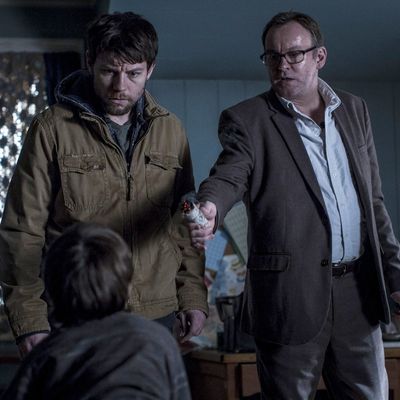
Although it’s too early to tell if Outcast can sustain itself, this Cinemax horror series from The Walking Dead creator Robert Kirkman at least has the right idea. In contrast to the Dead series, or for that matter, any season of American Horror Story, this mysterious, atmospheric tale of demonic and supernatural forces in ordinary lives seems informed by horror from an earlier, analog generation. Much modern horror feels obligated to periodically layer on the exposition to make sure everything is clear, and to give you a jump scare every five or ten minutes — to administer periodic adrenaline jolts to audience members with short attention spans, and to make it easy to pick out clips to upload to YouTube or reformat as gifs. Here, the approach to horror is more hermetic: horror as horror. It’s not about what’s withheld and revealed, nor is it about making you jump out of your seat (though it certainly does the latter). It’s about creating an unsettled feeling. You know something is horribly wrong but you aren’t exactly sure what, or how it relates to the thing you’re seeing onscreen or the sounds you’re hearing (or not hearing). It’s about harnessing the uncanny.
Outcast is set in the small town of Rome, West Virginia, a very Twin Peaks-y place to be. The hero is Kyle Barnes (Patrick Fugit), a young man who lives in a run-down old house (the whole town seems run-down, actually) and battles traumatic flashbacks to his childhood. It’s in this main plot and other, related subplots that Outcast traffics in metaphors bound to inspire think pieces about the problematic nature of this or that subject, but which are absolutely fair play in the horror genre (a genre that’s all about confronting taboos and showing you the absolute worst thing that can happen): Chiefly, the idea of mental illness and demonic possession as different phrases describing the same things. Kyle was horrendously abused and mistreated as a child, in ways that are unfortunately all too common, but which are presented here as … well, maybe it’s better not to say, exactly, except to warn you that you should and should not take anything literally.
A priest in town, Reverend Anderson (Philip Glenister), warns Kyle that the demons that tormented him in childhood are a danger to his fellow townspeople as well — that the evil is back, and it’s spreading. I am not sure how to describe what this means without giving away revelations that, while not exactly plot-driven, are nevertheless surprising and apt. Perhaps it’s better to just write around them and concentrate on what matters most here anyway — the overall vibe of the piece. The pilot, directed by Adam Wingard, sets a fine mood of menace, kicking off with a truly upsetting supernatural disturbance involving a child and periodically layering on more bizarre images, revolting acts of violence and self-harm, and images that have the hair-raising power of waking dreams. Very early on there’s a tight close-up of a cockroach crawling on a wall that’s skin-crawlingly vivid, not just because you’re looking at an insect photographed as if it were a giant beast, but because of the way the camera lingers on it, listening to the exaggerated sounds of its legs and antennae going skritch-skritch. The opening credits sequence, one of the most appropriate I’ve seen in terms of its ability to capture a show’s entire aesthetic, gives us images of the town from odd angles — tilted, upside down, irrationally framed. Life is out of balance. Something is terribly wrong here.
The standout cast includes Reg E. Cathey as the local sheriff, who drinks and plays poker with the reverend, and Wrenn Schmidt as the hero’s adopted sister Megan, who mothers him in his misery. All are given room to simply exist, to perform mundane tasks and participate in outwardly ordinary-seeming conversations, all of which feel slightly off because of the weird-grotesque-dreamy images and situations placed between them. It’s hard to say exactly where this show is going to take us, but I’ll definitely be following along for the ride, peeking through my fingers at times.





